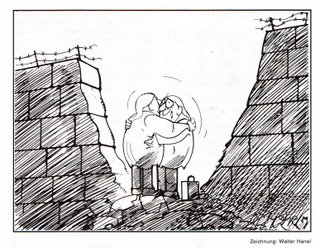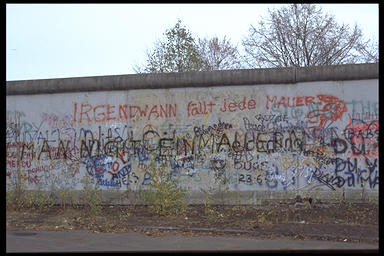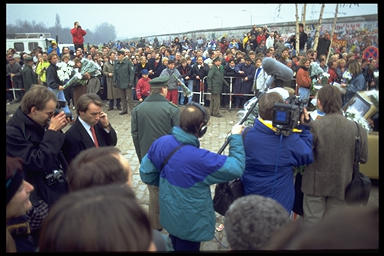This, for me, was the most powerful image depicting the fall of the Berlin Wall in 1989.
 The Ziggy-like figure drawn here is der Deutsche Michel, a national self-portrait much like Uncle Sam is to the US. With no words, the cartoonist successfully foreshadows the central problem to the unification of Germany. Namely, there are two Deutsche Michel. And the suitcase to the right of the pair signifies that the Michel from the East plans on moving in with the Michel from the West. The day was triumphant, but problems lay ahead. It, however, was carried by a force stronger than any reason or doubts about what the future would bring.
The Ziggy-like figure drawn here is der Deutsche Michel, a national self-portrait much like Uncle Sam is to the US. With no words, the cartoonist successfully foreshadows the central problem to the unification of Germany. Namely, there are two Deutsche Michel. And the suitcase to the right of the pair signifies that the Michel from the East plans on moving in with the Michel from the West. The day was triumphant, but problems lay ahead. It, however, was carried by a force stronger than any reason or doubts about what the future would bring.
Otto Graf Lambsdorff, FDP chairman, said of the fall (my translation),
According to David Hackett Fischer in his book, Liberty and Freedom, (p. 5),
A person was free because he belonged to the group. Freedom was closely associated with kinship ties and responsibility to fellow members as well as personal rights.
This is very much the sense of freedom meant in Otto Graf Lambsdorff's statement above. There was a force behind the two nations coming together. Part of that strength originated from notions of rights and a desire to be free of the oppression of the GDR. Just as strong, however, were the kinship ties and and feelings of connectedness between the two Germanies. As the wall came down, a nation rejoiced and complete strangers embraced and shared toasts.
In this sense of the word, our freedom is an inherent birthright which cannot be taken away by men. It, however, stems from our belonging to a group of free people governed by law. Our connection to one another is as important as our rights. I think these concepts are also very applicable as we raise our children. As they grow and mature and desire more freedom, it is time to let them begin to experience what true freedom is: a combination of rights and responsibilities.
* an asterik following a word in linguistics signifies that the word is reconstructed from its "descendants."
The cartoon is from a publication put out by the Federal Republic of Germany, and to my knowledge is in the public domain. The publication is Die Wende in der DDR from the Kontrovers series and is published by the Bundeszentrale fuer politische Bildung (July 1990).
Wes' Corner shares some insights about rights and responsibilities in a more modern sense. (If you follow this link, some of the comments are aggressive.)
freedom, berlin, homeschooling, history
 The Ziggy-like figure drawn here is der Deutsche Michel, a national self-portrait much like Uncle Sam is to the US. With no words, the cartoonist successfully foreshadows the central problem to the unification of Germany. Namely, there are two Deutsche Michel. And the suitcase to the right of the pair signifies that the Michel from the East plans on moving in with the Michel from the West. The day was triumphant, but problems lay ahead. It, however, was carried by a force stronger than any reason or doubts about what the future would bring.
The Ziggy-like figure drawn here is der Deutsche Michel, a national self-portrait much like Uncle Sam is to the US. With no words, the cartoonist successfully foreshadows the central problem to the unification of Germany. Namely, there are two Deutsche Michel. And the suitcase to the right of the pair signifies that the Michel from the East plans on moving in with the Michel from the West. The day was triumphant, but problems lay ahead. It, however, was carried by a force stronger than any reason or doubts about what the future would bring.Otto Graf Lambsdorff, FDP chairman, said of the fall (my translation),
The force of freedom is stronger than concrete and iron.The German word freiheit and the English word freedom are closely related, sharing a common root in indoeuropean frijaz* and sharing cognates across the Germanic languages of Europe. Freedom (Freiheit) has strong roots in Germany, and these concepts stayed with the Angles and the Saxons as they settled England. It is, in fact, a very unique concept, completely unrelated and in some ways opposed to Latin and Greek notions of liberty and eleutheros which I will talk about later.
According to David Hackett Fischer in his book, Liberty and Freedom, (p. 5),
Free meant someone who was joined to a tribe of free people by ties of kinship and rights of belonging.These tribes were ruled not by kings or chiefs, but by law. Freedom was viewed as a birthright, and with it came rights and responsibilities within the clan. The laws were recited before the highly critical clan members and disputes over points would be settled by calling in five legal experts to judge the matter. One 11th century historian wrote of Iceland, "there is no king but only law." (Fisher, p. 6) Regardless of station, all were viewed as equal before this law. Most important in their conception, however, was the connectedness. The ultimate punishment for not adhering to the law of the clan was banishment.
A person was free because he belonged to the group. Freedom was closely associated with kinship ties and responsibility to fellow members as well as personal rights.
This is very much the sense of freedom meant in Otto Graf Lambsdorff's statement above. There was a force behind the two nations coming together. Part of that strength originated from notions of rights and a desire to be free of the oppression of the GDR. Just as strong, however, were the kinship ties and and feelings of connectedness between the two Germanies. As the wall came down, a nation rejoiced and complete strangers embraced and shared toasts.
In this sense of the word, our freedom is an inherent birthright which cannot be taken away by men. It, however, stems from our belonging to a group of free people governed by law. Our connection to one another is as important as our rights. I think these concepts are also very applicable as we raise our children. As they grow and mature and desire more freedom, it is time to let them begin to experience what true freedom is: a combination of rights and responsibilities.
* an asterik following a word in linguistics signifies that the word is reconstructed from its "descendants."
The cartoon is from a publication put out by the Federal Republic of Germany, and to my knowledge is in the public domain. The publication is Die Wende in der DDR from the Kontrovers series and is published by the Bundeszentrale fuer politische Bildung (July 1990).
Wes' Corner shares some insights about rights and responsibilities in a more modern sense. (If you follow this link, some of the comments are aggressive.)
freedom, berlin, homeschooling, history


